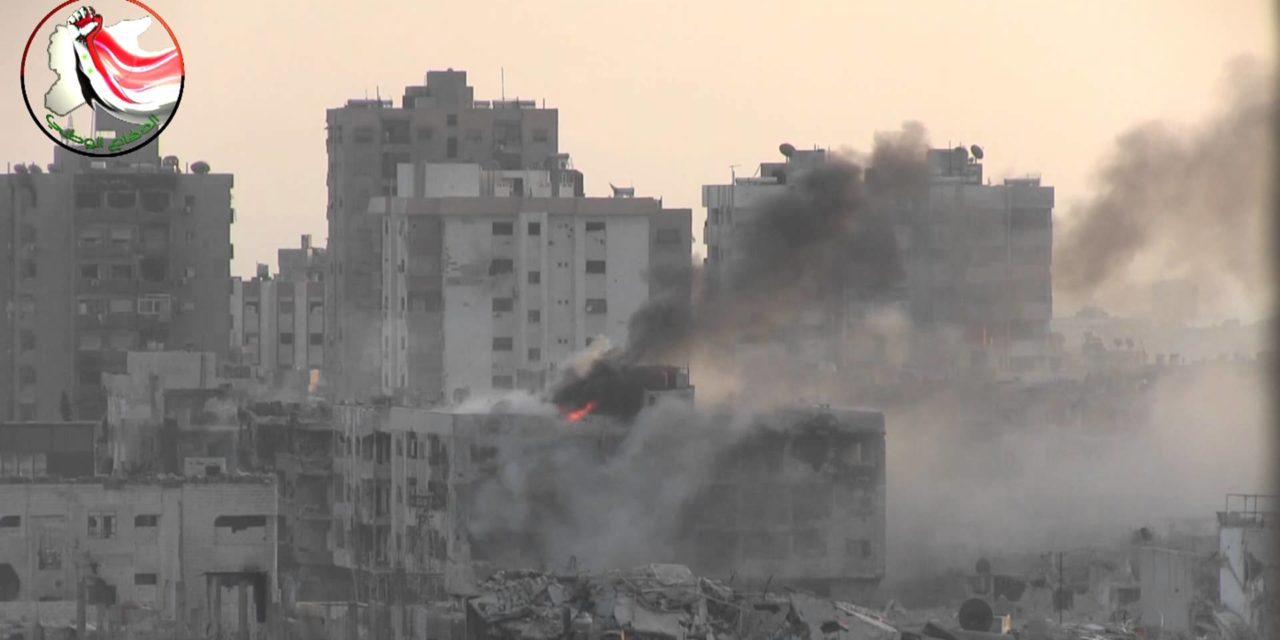SYRIA
The Assad regime launched the third front in its autumn offensive, with Syria’s military attacking insurgents in the Qalamoun mountains between Damascus and the Lebanese border.
Assad’s forces have stepped up assaults south of Damascus and east of Aleppo in the past two months, with notable successes in both cases. However, the biggest challenges lay ahead — insurgents still hold key suburbs of the capital and are entrenched in Aleppo after 16 months. Qalamoun may also prove difficult ground for victory, as local opposition fighters know the terrain and have been co-ordinating defenses in anticipation of the regime’s autumn campaign.
The Qalamoun offensive added yet more refugees to the growing humanitarian crisis, with more than 1000 residents fleeing into Lebanon.
Both sides suffered notable losses in the week: several opposition commanders were killed or wounded by a regime airstrike in Aleppo, with Liwa al-Tawhid head Abdul Qadir al-Saleh dying of his injuries. Insurgents detonated a bomb under an Army administrative building in Harasta near Damascus (see Featured Photo), claiming the death of four generals amid 31 killed.
On the political front, the show of discussions for the oft-delayed, never-held “peace” conference continued. The latest effort began on Monday with Moscow hosting Syrian and Iranian delegations.
RISK ANALYSIS
Unless the Syrian military can achieve quick results, it may face the enemy of time with winter approaching. While its recent victories are not to be dismissed — particularly the capture of as-Safira near Aleppo and the taking of several towns south of Damascus — they do not constitute a breakthrough. The initial reports from Qalamoun, mainly of bombardment of the town of Qarah, do not point to a significant advance and occupation of territory by Assad’s forces.
The latest political talks are for show, notably of Russian and Iranian support for the Assad regime, and offer little prospect of an international conference.
FEATURED ANALYSES
Syria Special: The Tragi-Comedy of the Failed Mission of Russia’s Military Contractors For Assad
Syria In-Depth: Chechen Leader In Aleppo Talks About Islamic State of Iraq’s Expulsion of “Warlord” Hayani
***
IRAN
The nuclear talks continue to dominate Iranian news, with Tehran and the 5+1 Powers re-convening in Geneva this week in another attempt to reach an interim deal.
Signals have been mixed. Both a senior Obama Administration official and Russian Foreign Minister Sergei Lavrov spoke of a “very good chance” of an agreement.
However, French President Francois Hollande’s trip to Israel put up a challenge: Hollande set four conditions for any deal, and US officials — 48 hours after the hopeful statement from the White House — told the Israeli press that Iran would have to cap its low-level uranium enrichment as well as production of 20% fuel.
Iran has also put out a combination of hopeful and cautious messages. Foreign Minister Mohammad Javad Zarif indicated that Tehran may not require a public recognition of its right to enrichment in an agreement — even though in practice the deal will allow this — but President Rouhani warned against “excessive demands” by the 5+1 Powers.
In another twist on Monday, US Secretary of State John Kerry postponed a Friday visit to West Jerusalem, averting any appearance with Israeli Prime Minister Benjamin Netanyahu while the Geneva talks were in progress.
RISK ANALYSIS
The balance of signals is still positive for the nuclear talks. Iran’s step-back from a public recognition of its right to enrich meetings meet one of the two obstacles thrown up by France 10 days ago in Geneva.
The question of the Arak heavy-water reactor remains. Paris is insisting that construction is suspended, because it says the natural by-product of plutonium could be put to military use, and Iran resisting any halt. A possible compromise in Geneva may be an inspection regime to monitor the development of the plant, which is scheduled for operation in late 2014.
FEATURED ANALYSES
Iran Video Analysis: US Hard-liners, Deception, & the Quest for “Permanent Conflict”
Iran Spotlight: Sunni Insurgents Jaish ul-Adl — Tehran Must End Support For Assad
***
MIDDLE EAST
Recurrent violence between militias flared on Friday, with at least 43 people killed when a Misrata militia fired on protesters demanding that it leave a Tripoli neighborhood.
The clashes eased on Saturday, but raised a further question over whether the Zeidan Government could establish effective security and a national force to meet the challenge of the militias.
In a meeting with significance both for Turkey’s negotiations with its Kurdish groups and with Ankara’s foreign policy in Iraq and Syria, Turkish Prime Minister Recep Tayyip Erdogan met the head of the Iraqi Kurdish Regional Government, Massoud Barzani.
Both sides criticized the recent announcement by the Syrian Kurdish movement PYD of steps towards an autonomous Syrian Kurdistan.
FEATURED ANALYSIS
Turkey Spotlight: The Kurds & Ankara’s Foreign Policy Dilemma
***
RUSSIA
As Moscow issued amended legislation to punish Russians fighting abroad, including in Syria, a former advisor to Vladimir Putin pressed a “new national identity” — harking back to the 19th-century Slavophile movement — to unite the peoples of the Russian Federation.
FEATURED ANALYSES
Russia Spotlight: Amended Legislation Targets Russians Fighting In Syria
Russia Spotlight: Former Putin Adviser Karaganov Calls For “New National Identity”

